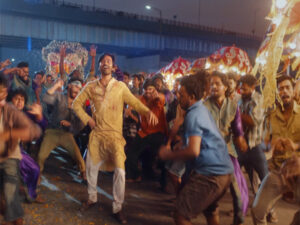Wanted to show the reality of Punjab through ‘Jaggi’: director Anmol Sidhu
New Delhi, May 28 (PTI) Punjab of Hindi films is different from reality, says “Jaggi” filmmaker Anmol Sidhu, who believes native storytellers need to step up and present the true picture of the state.
Sidhu’s “Jaggi” has been hailed by critics as an incisive take on the hyper and toxic masculine culture among the youth of Punjab. The film, which won awards in the Indian Film Festival of Los Angeles (IFFLA) and Inaugural Cinevesture International Festival (CIFF), is now screening on streaming platform MUBI.
“You will see the reality of Punjab in Chandigarh, in the Panjab University. And then you come to the rural areas where you see a different Punjab. Bollywood makes films about Punjab where people are dancing in fields. You will have comedy scenes and that makes you think that Punjab is like that.
“In fact, my family members often ask me why don’t I make films like Bollywood. But my attempt with ‘Jaggi’ was to show the reality of Punjab,” Sidhu told PTI in an interview.
There has been an influx of stories that have started to offer a more nuanced portrayal, often addressing social issues such as drug problem and socio-political issues in the state with movies such as “Udta Punjab”, “Meel Patthar” and OTT shows like “Kohrra” and “Tabbar”.
Sidhu has an interesting take on this as he believes that the makers of these films and shows are not actually from Punjab.
“It is not the people of Punjab that are making films about the state. It is people from outside who have found out different stories of the state. ‘Kohrra’ is a good show but it is not made by someone who comes from Punjab.
“There are only a handful of storytellers from Punjab like Gurvinder (Singh) sir or Jatinder Mauhar, who are trying to show something different. I believe filmmakers from Punjab should make cinema that reflects the reality of the state. Even actors from Punjab, they still don’t get work that they deserve,” he added.
Ramnish Chaudhary, who plays the lead role of Jaggi, said he never imagined that the film will have such a journey.
“I didn’t even anticipated it going to any film festival… We created the character together. I surrendered myself to Anmol’s vision,” Chaudhary said.
“Jaggi” marks the feature directorial debut of Sidhu, who earlier made the short film “The Last Tree” in 2020.
The film, crafted with a hands-on approach, addresses issues of toxic masculinity and challenges stereotypical depictions of Punjabi machismo, chronicling the distressing story of its titular character.
Navigating between the past and present experiences of the central character, the film first delves into the severe bullying and repeated sexual assault that Jaggi faces in his school in rural Punjab. It then shifts focus to the present with Jaggi on the verge of getting engaged and how his past experiences still haunt him.
With the movie, Sidhu said the aim was to highlight the issues of sexual repression and the severe gender segregation prevalent in his community.
“Honestly, I was not aware of terms like hyper masculinity when I made the film. When I was writing the film, my understanding of life in Punjab was simple — that a girl and a boy can’t meet in private. And because of this, young people have a lot of frustration.”
What happens in the case of extreme sexual frustration is what Sidhu has tried to show in “Jaggi”.
“It is all about the frustration in young men and how they take it out on small kids or those who are weak. I imagined how a person’s life would be affected if such a thing happens to him?”
Sidhu believes the easy access to adult videos as well as the songs and movies coming out of Punjab have contributed to the problem of sexual frustration among the youth.
“Right now, the kind of songs that are coming out of Punjab, they have a really bad influence over the public. Everyone wants to follow the singers and do stuff like them.”
“Jaggi” is made in a DIY (do it yourself) fashion.
“There was no proper financing that we received for this film. The producer used to give us his salary, which was Rs 10,000, that he would receive at the end of the month. And that helped us a lot, for travel and food. Things happened slowly over time. The camera that I used, I had taken from my friends,” he said.
We learnt on the job and did everything, including dubbing and editing, on our own,” he added.
With the film becoming available on MUBI, Sidhu believes he can now move forward in life.
“I feel the journey is now coming to an end. We started on this movie in March 2020… After the film was made, we faced difficulties in showcasing it. For about a year, it didn’t go to any film festivals… I used to feel that if it is not screened anywhere, then what will happen to it?
“But I believe that every film comes with a journey. This film had its own journey and finally it is coming to MUBI.”






